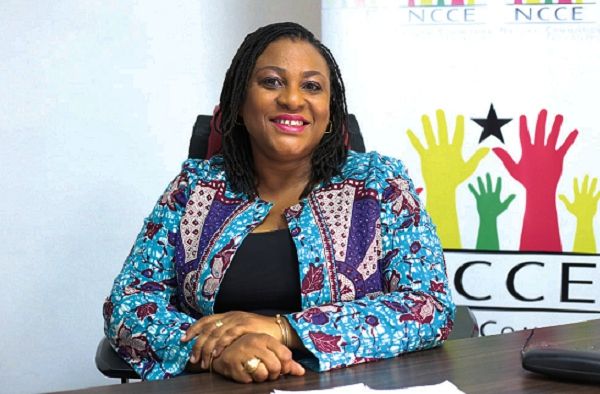Speakers at the launch of the End-Line Survey on Public Opinion on the State of Corruption, Public Accountability and Environmental Governance in Ghana conducted by the NCCE, commended the Commission for a good job done in producing the report.
Executive Director of the Ghana Integrity Initiative (GII), Linda Ofori-Kwafo, who reviewed the report praised the Commission for adopting an appropriate project management approach and for adopting a robust research methodology that covered 108 districts in all 16 regions of the country.
Stating that the fight against corruption was yielding some marginal results, Mrs. Ofori-Kwafo noted that the bit about whistle blowers not being safe is damning. She therefore called for more funding for NCCE and effective collaboration between the Commission and state institutions to do more to fight against corruption.
Likewise, , Director General of the Internal Audit Agency, Dr. Eric Oduro Osae, commended NCCE for producing the report and encouraged the Commission to produce Issue Paper based on the report and further collaborate with state institutions to sustain the fight against corruption.
He equally called for the publication of the report as well as anti-corruption laws in widely spoken Ghanaian languages so that citizens would be properly informed and take appropriate actions in the fight against corruption.
Presenting highlights of the Survey, the Director of Research, Gender and Equality at the NCCE, Dr. Henrietta Asante-Sarpong, said the study in August 2020 found that 86.8% of the respondents at the end-line stage still perceive corruption as high in the country.
The End-Line Survey which sampled 4,284 Ghanaians in 108 districts evaluated participants’ opinions on anti-corruption after the implementation of the Accountability Rule of Law and Anti-Corruption Programme (ARAP) since 2016.
Of the two surveys conducted: the baseline in 2017 and the end-line in 2020, Dr Asante-Sarpong observed that embezzlement (90.2%B, 87.7%E) and fraud (89.0%B, 85.5%E) featured as acts of corruption according to most of the respondents who still perceived the Ghana Police Service, Schools, Hospital and public institutions as corrupt.
Besides poor sanitation remaining a topmost environmental concern in Ghana, Dr. Asante-Sarpong added that approximately 60% of the respondents had received education on ARAP from the NCCE during the span of the project.
The Head of the European Delegations to Ghana, Ambassador Mrs. Diana Acconcia, who launched the report, commended the NCCE for the work delivered over the years and reminded the Commission not to relax on its oars since the fight against corruption was far from being achieved.
She challenged the Commission and key stakeholders to continue engaging in relevant public campaigns using the findings of the study to mount pressure on duty bearers to commit to addressing the corruption in the future.
The Ambassador recounted the broad objective of the ARAP’s project to achieve a more accountable and efficient public sector that delivers effectively at the national and local levels.
She observed that the achievement under the project are like seeds the EU planted which would hopefully grow to become powerful trees of accountability in Ghana.
Although the project has closed, Mrs. Diana Acconcia assured stakeholders and Ghanaians that the doors of the EU are still opened for key suggestion on ARAP.
The Deputy Chairman in charge of Operations at the NCCE, Mr. Samuel Asare Akuamoah, said the NCCE got involved in the ARAP project funded by the EU as implementing partners over the past four years as part of the mandate of the Commission.
He said it was in fulfilment of promoting good governance, fight against corruption and in realisation of Sustainable Development Goal 16 and 12. He added that the survey encapsulates NCCE’s elaborate public education drive and the gains made.
Ms. Kathleen Addy, Deputy Chairman in charge of Finance and Administration at the NCCE, asserting the importance of research saying a country cannot make progress without identifying its problems and evolving intervention to address them.
Ms. Kathy thanked the EU for providing funding for the ARAP project and called on stakeholders including the media to go beyond the launch and help translate them into policies for the good of Ghana. “Research is a public good and so must be used for the good of the public” she stressed.
Under the four-year project, the EU supported the Office of the Attorney General, the Ghana Police Service, the Economic and Organised Crimes Office (EOCO), as well as the Environmental Protection Agency (EPA) and the NCCE to strengthen their capacities in the fight against corruption.
Latest Stories
-
Inflation to witness another sharp decline in June 2025 to 16% – IC Research
2 minutes -
Republic Bar & Grill Marks 13 Years with Burkina Faso Solidarity Concert
2 minutes -
GH₵1 Energy levy likely to return amid sector pressures – Dr Theo Acheampong
9 minutes -
Ghana is uniquely positioned to leverage AI to lead innovation in Africa – Deloitte Transactions Partner
13 minutes -
3 pupils, taxi driver killed in crash near Winneba Junction
15 minutes -
Economy to grow by more than 4.8% in 2025 – IC Research
19 minutes -
US visa tips: 10 key insights revealed by the US Consul General on Joy FM’s SMS
29 minutes -
Scars of Hooliganism: ‘It’s the worst thing you can think of’ – Maxwell Konadu on violence
45 minutes -
NIA workers declare strike action over withheld allowances
49 minutes -
Rehoboth Properties responds to allegations of power theft at Kweiman Estate
1 hour -
Your social media activity can affect your student visa application – U.S. Consul General
1 hour -
GJA elections committee chairman reaffirms commitment to credible polls
2 hours -
Visa denial is not deliberate; adhere to the rules – U.S Consul General
2 hours -
Part of Accra Sports Stadium still closed as NSA lacks funds for repairs
2 hours -
Haruna Mohammed calls for amendment of political parties act to enable financial independence
2 hours

